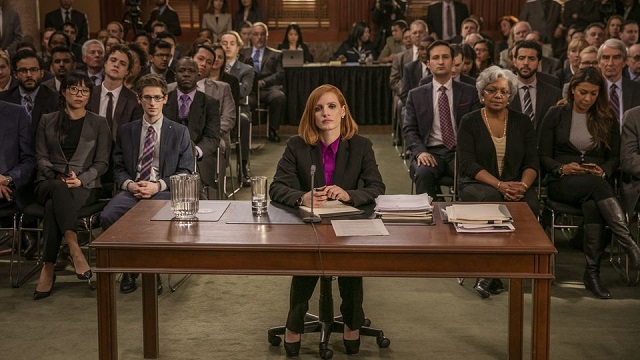At my screening of Miss Sloane, I sat in the back row of the somewhat small theater. It was a packed house, and the back row still had a couple free spots left. Some boisterous lady was organizing a large group that spread out across various parts of the theater with pockets of people from the very front row to the very back of the seat, joyously shouting directions to various members of her group to try to organize seating charts. She ended up sitting two people next to me when the actual movie played, and, as the movie went on, she increasingly thought she was in her living room watching television. On occasion, she had some perfectly incisive observations, but her most truthful statement was the refrain that Miss Sloane was just Scandal for white people. She’s not wrong. Miss Sloane is what happens when somebody wants to Make A Statement while binge watching too much television, worshiping at the Altars of Sorkin and Shonda.
Elizabeth Sloane (Jessica Chastain) is a tough, intelligent, fierce, cold, calculating bitch, by which I mean, she’s a lobbyist. Well, she’s not really a lobbyist in the terms we think. She’s more of a marketing director who manages political campaigns for various political bills running through the US congress. Miss Sloane sends politicians on exotic vacations to “assess” the viability of foreign tariffs, and manipulates news stories to control the popular opinion. Usually, her morality is for sale to the highest bidder, except when a bunch of rich white dudes (including the owner of her firm) want to hire her to work for the NRA to kill some gun control bill. Instead, she deflects to a different company and runs a campaign for the opposition. OFirst time screenwriter Jonathan Perara and director John Madden (Shakespeare in Love) are concocting a House of Cards circus of multi-dimensional chess with questionable morality.
You know, I would absolutely love watching a movie about making the sausage with a strong, intelligent, capable woman at the helm. But, Miss Sloane is also a pill-popping, prostitute-using emotional wreck of a woman. Successful women always have to pay some sort of price in order to ascend to the top of their careers. Going back to House of Cards, the drug-addicted prostitute-using male character is using these behaviors because he is morally weak and has limited impulse control. Miss Sloane is using these because she can’t cope with the stress of her positions.
Miss Sloane is 132 minutes, the length of a mere three episode arc of Scandal, but contains enough material to sustain a short season of television. For a movie ostensibly about making the sausage (and the corruption therein), Miss Sloane condenses major plot developments. The MacGuffin at the center of the movie is a white board where they’ve posted the photos of the various senators and the way those senators are voting (apparently nobody gives a crap about the house of representatives). They need to reach 60 votes to have a filibuster-proof majority, beginning with a 14 voter deficit. Apparently these senators are fickle and will change their minds based on a CNN television interview or an attempted murder, and the board usually changes in large pushes rather than incremental steps.
Perara writes from an odd mix of modern apolitical cynicism and millennial shiny-eyed optimism. He obviously wants to expose the broken nature of our political process, and how moneyed interests are more in charge than we expect. He has little actual insight into the lobbying process, and no ideas on how to fix it. Everything is broken, so let’s exploit it for entertainment. And yet, he possesses a Frank Capra-esque optimism about human nature. He believes that some people are actually driven by a core morality even if their outward persona is corrupt.
John Madden largely gets out of the way of the screenplay, letting the actors deliver the lengthy dialogue at a demanding clip, plowing through pages of Sorkin-lite dialogue as quickly as possible. It’s accentuated by unambitiously pleasant cinematography, paced like a rocket that’s too big for its own good, and a score that’s cloy and bombastic without being obvious. This is the cinematic equivalent to a John Grisham novel, a feel good piece of commercial art based on controversial politics designed to be simplistic and easy to swallow while trying to make the audience feel smart for understanding the film and agreeing with the content.
As much as I want to dislike Miss Sloane, it’s a clever and accessible movie for adults that deals with important issues without making them into a mockery. It’s blissfully not a dour display of super-serious issues drowning in its own importance. Perhaps it can be seen as Oscar Bait: Oscar winning actors playing important people using big dialogue to deal with big liberal issues in straight-forward and emotionally unchallenging scenarios. But, for once, I had a good time at this.

